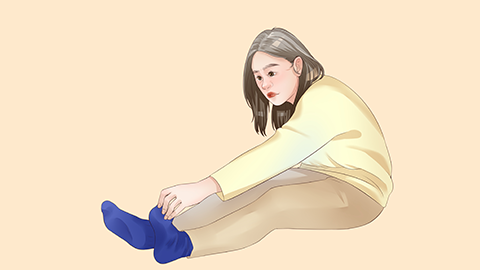What causes leg cramps in the calf during sleep?
Leg cramps during sleep may be caused by improper sleeping posture, exposure to cold, hypomagnesemia, lower limb arteriosclerosis, lumbar disc herniation, etc. If abnormalities occur, timely medical consultation is recommended. Specific analysis is as follows:

1. Improper sleeping posture: Prolonged supine or prone sleeping can compress the calf muscles and hinder blood circulation, possibly causing cramps. It is recommended to adjust sleeping posture, avoid leg compression, and change positions appropriately to reduce the occurrence of cramps.
2. Exposure to cold: When the calf is exposed to cold during sleep, the muscles are stimulated by low temperatures, increasing their excitability and causing tonic contractions that lead to cramps. Keep legs warm during sleep, cover adequately with blankets, and avoid direct blowing from air conditioners or fans onto the legs.
3. Hypomagnesemia: A deficiency of magnesium in the body can affect the normal function of nerves and muscles, leading to abnormal muscle excitability and causing leg cramps during sleep. This is often accompanied by symptoms such as hand and foot cramps, irritability, and arrhythmia. Treatment mainly involves taking medications such as magnesium oxide, potassium magnesium aspartate tablets, and magnesium sulfate injection as directed by a physician.
4. Lower limb arteriosclerosis: Atherosclerosis of the lower limb arteries causes narrowing of the vascular lumen and impaired blood flow. During sleep, limb activity decreases further, slowing circulation and causing ischemia and hypoxia in the calf muscles, which can trigger cramps. This is often accompanied by symptoms such as coldness, numbness in the lower limbs, and intermittent claudication. Doctors generally recommend treatment with medications such as simvastatin tablets, aspirin enteric-coated tablets, and cilostazol tablets.
5. Lumbar disc herniation: Lumbar disc herniation can compress nerve roots. Improper lumbar posture during sleep may worsen this compression, leading to abnormal nerve conduction and causing calf cramps. This is often accompanied by symptoms such as low back pain and radiating pain in the buttocks and lower limbs. It is recommended to take medications such as diclofenac sodium sustained-release tablets, mecobalamin tablets, and vitamin B1 tablets under medical guidance.
In daily life, maintain a regular routine, avoid strenuous exercise before bedtime, stretch calf muscles appropriately, maintain a balanced diet, and consume more foods rich in magnesium, calcium, and other minerals to reduce the occurrence of leg cramps during sleep. If cramps occur frequently or are accompanied by other discomforts, seek timely medical evaluation to identify the underlying cause and receive targeted treatment.




